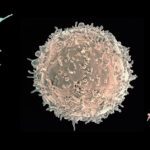A quarter of the world’s population is infected by Mycobacterium tuberculosis (M. tb), the causative agent of tuberculosis (TB), but only 5 to 10% develop an active form of the disease. It is therefore important to better understand how M. tb infection impacts the host immune response at the different stages of infection, from asymptomatic latent infection to active TB disease.
To do so, the team of Darragh Duffy, in collaboration with a team in Cape Town University (South Africa) stimulated whole blood from active TB patients and latently infected (LTBI) controls with M. tb antigen, BCG and IL-1β and compared their immune responses at the proteomic, transcriptomic and metabolomic levels. Several genes were differentially expressed between both populations including those proposed for new diagnosis tools, with this immune stimulation strategy improving the stratification based on these existing 3- or 11-gene signatures.
A series of experiments highlighted the IL-1 family cytokines as particularly dysregulated in TB patients. The antagonist IL-1ra is elevated in TB patients, which is associated with the activation of the PPRAγ pathway through pregnane steroids. The PPARγ pathway is therefore an interesting new target to limit cytokine production and M. tb replication. BGG stimulation induces a lower secretion of IL-1α and IL-1β cytokines in active TB patients compared to LTBI patients. Finally, IL-1β stimulation leads to perturbed IL-1β signaling for active TB patients, which is restored after antibiotic treatment.
Source
Tuberculosis alters immune-metabolic pathways resulting in perturbed IL-1 responses, Frontiers in Immunology, December 14, 2022





